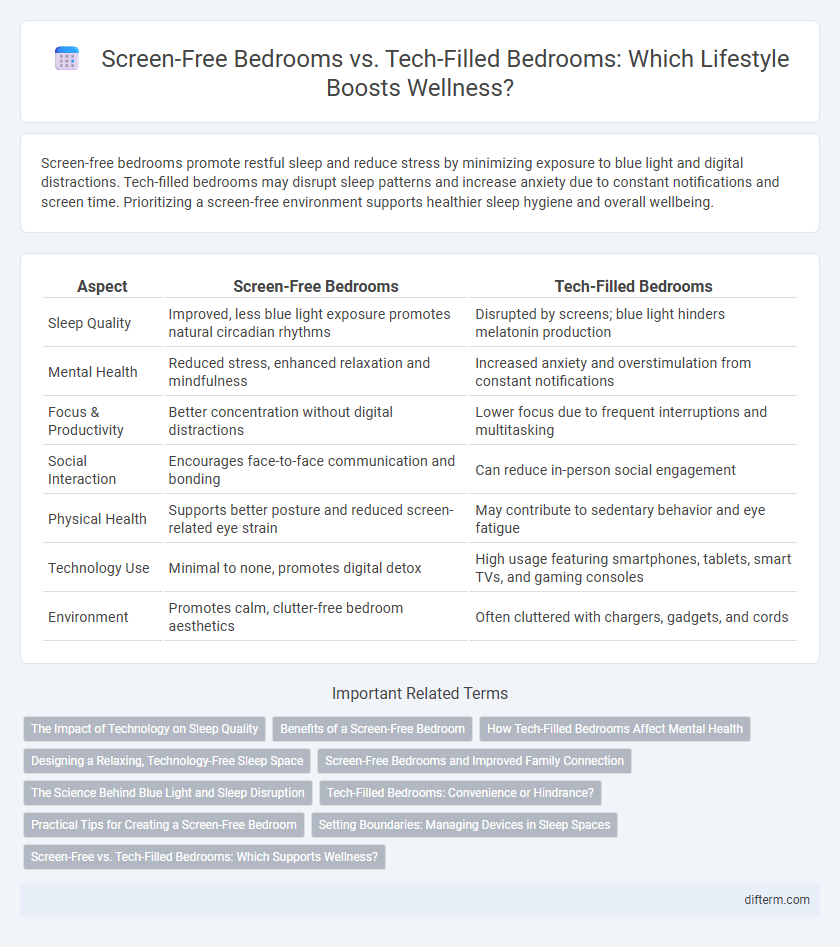Screen-free bedrooms promote restful sleep and reduce stress by minimizing exposure to blue light and digital distractions. Tech-filled bedrooms may disrupt sleep patterns and increase anxiety due to constant notifications and screen time. Prioritizing a screen-free environment supports healthier sleep hygiene and overall wellbeing.
Table of Comparison
| Aspect | Screen-Free Bedrooms | Tech-Filled Bedrooms |
|---|---|---|
| Sleep Quality | Improved, less blue light exposure promotes natural circadian rhythms | Disrupted by screens; blue light hinders melatonin production |
| Mental Health | Reduced stress, enhanced relaxation and mindfulness | Increased anxiety and overstimulation from constant notifications |
| Focus & Productivity | Better concentration without digital distractions | Lower focus due to frequent interruptions and multitasking |
| Social Interaction | Encourages face-to-face communication and bonding | Can reduce in-person social engagement |
| Physical Health | Supports better posture and reduced screen-related eye strain | May contribute to sedentary behavior and eye fatigue |
| Technology Use | Minimal to none, promotes digital detox | High usage featuring smartphones, tablets, smart TVs, and gaming consoles |
| Environment | Promotes calm, clutter-free bedroom aesthetics | Often cluttered with chargers, gadgets, and cords |
The Impact of Technology on Sleep Quality
Screen-free bedrooms promote better sleep quality by reducing blue light exposure, which disrupts melatonin production and circadian rhythms. Tech-filled bedrooms often lead to increased sleep disturbances due to notifications and screen time before bed, resulting in shorter REM sleep and poorer overall rest. Creating a technology-free sleep environment enhances relaxation and supports deeper, more restorative sleep cycles.
Benefits of a Screen-Free Bedroom
A screen-free bedroom promotes better sleep quality by reducing exposure to blue light, which disrupts melatonin production and circadian rhythms. It minimizes distractions and mental stimulation, fostering relaxation and deeper rest. This environment supports improved mental health by encouraging mindfulness and reducing anxiety linked to constant connectivity.
How Tech-Filled Bedrooms Affect Mental Health
Tech-filled bedrooms often disrupt sleep patterns due to the blue light emitted from screens, which interferes with melatonin production and can increase insomnia risk. Constant exposure to notifications and digital stimuli elevates stress levels and reduces opportunities for mental relaxation, contributing to anxiety and decreased focus. Creating screen-free bedrooms supports healthier sleep hygiene and promotes mental well-being by fostering a calm, technology-free environment.
Designing a Relaxing, Technology-Free Sleep Space
Designing a relaxing, technology-free sleep space improves sleep quality by minimizing blue light exposure and reducing mental stimulation before bedtime. Incorporating soft lighting, natural materials, and calming colors promotes a restful atmosphere that supports circadian rhythms. Prioritizing screen-free bedrooms creates an environment conducive to deeper, more restorative sleep and overall well-being.
Screen-Free Bedrooms and Improved Family Connection
Screen-free bedrooms create a sanctuary that promotes restful sleep and reduces exposure to blue light, fostering healthier sleep patterns for all family members. By eliminating screens, families experience enhanced face-to-face interactions and deeper emotional connections, strengthening bonds and communication. This intentional space encourages mindfulness and presence, contributing to a more harmonious and connected household environment.
The Science Behind Blue Light and Sleep Disruption
Exposure to blue light from screens in tech-filled bedrooms suppresses melatonin production, disrupting the natural sleep-wake cycle and reducing sleep quality. Scientific studies show that screen-free bedrooms promote deeper, more restorative sleep by minimizing blue light interference. Creating a tech-free sleep environment supports circadian rhythm regulation and enhances overall health and well-being.
Tech-Filled Bedrooms: Convenience or Hindrance?
Tech-filled bedrooms offer unparalleled convenience through smart lighting, voice-activated assistants, and connected entertainment systems that enhance daily routines and relaxation. However, excessive screen presence often disrupts sleep quality by increasing exposure to blue light, leading to difficulty falling asleep and reduced restfulness. Balancing technology use with intentional screen-free moments can optimize comfort and promote healthier sleep patterns in modern living spaces.
Practical Tips for Creating a Screen-Free Bedroom
Design a screen-free bedroom by removing all electronic devices such as TVs, smartphones, and laptops to promote better sleep quality and reduce blue light exposure. Replace screens with relaxing elements like books, soft lighting, and calming scents to enhance tranquility and foster deeper rest. Implement a tech curfew by charging devices outside the bedroom to establish firm boundaries between rest time and digital distractions.
Setting Boundaries: Managing Devices in Sleep Spaces
Establishing screen-free bedrooms enhances sleep quality by reducing blue light exposure and minimizing distractions, promoting deeper, more restorative rest. Incorporating designated charging stations outside the bedroom helps manage device use while maintaining accessibility. Clear boundaries around technology encourage mindfulness and improve overall mental well-being by fostering an environment conducive to relaxation and disconnection from digital stimuli.
Screen-Free vs. Tech-Filled Bedrooms: Which Supports Wellness?
Screen-free bedrooms promote relaxation and deeper sleep by minimizing blue light exposure and reducing mental stimulation, essential for overall wellness. In contrast, tech-filled bedrooms often disrupt circadian rhythms due to constant notifications and screen use, leading to increased stress and poor sleep quality. Creating a screen-free environment enhances mindfulness and supports restorative rest, crucial for maintaining physical and mental health.
screen-free bedrooms vs tech-filled bedrooms Infographic

 difterm.com
difterm.com